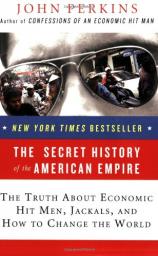Reading Group Guide
Discussion Questions
The Secret History of the American Empire

1. Do you agree with Perkins’ statement that the corporatocracy is in fact an empire? If so, why? If not, why not?
2. Perkins’ characterization of Hugo Chavez, president of Venezuela, is markedly different from the way he has been depicted in the mainstream media. How do you account for these differences? Which, if either, characterization do you find more plausible? Why?
3. The United States’ war in Iraq is now in its fifth year. Perkins considers this war more dangerous to U.S. interests abroad than was the Vietnam war --- he describes the Iraq war as a “clash of ideologies” rather than simply a regional conflict. What is your position on the Iraq war? Which, if any, of Perkins’ opinions on the subject do you find valid? Why?
4. Perkins contends that the Central Intelligence Agency and the National Security Agency, which report to the executive branch of the United States government, authorized and in some cases carried out a number of assassinations of democratically elected leaders in Latin America and Africa who had refused to allow the corporatocracy to continue to do business as usual. Do you believe that any of these allegations are true? If so, why? If not, why not?
5. Perkins says that foreign governments that decline to be intimidated by the corporatocracy are routinely labeled “communist” by the U.S. government. What purpose would using the word “communist” serve in this context?
6. He also contends that most such governments, particularly those in Latin America, are trying to ensure that their national resources are used to benefit their own citizens rather than foreign countries and businesses. Would you describe such actions as “communistic”? Regardless of how they are labeled, do you believe that the resources of foreign countries should be fair game for acquisition by those with the most money and/or political clout?
7. Perkins says that the increased number of democratically elected leaders in Latin America who are systematically opposing the corporatocracy is proof that nations need not bow to foreign exploitation. What is your view on the subject?
8. Perkins charges that international corporations such as Nike are responsible for making the lives of sweatshop workers miserable. He cites the work of documentary filmmakers who have lived in the same conditions as Indonesian workers as proof. Do you think such information is valid? If so, how will it affect you personally?
9. Which of the incidents that Perkins describes in his book do you find the most disturbing? Why?
10. Several places in the book, Perkins states that male domination of the corporatocracy leads to its indiscriminate raping and pillaging of Third World cultures and the environment. On page 69, he describes the attitudes of the Shuar people of the Amazon, who believe that men are responsible for hunting, gathering firewood, and protecting their people from threatening tribes, and women are responsible for raising children, growing crops, looking after the home, and telling the men when they need to stop what they are doing. Do you think that giving women more say in running corporations, governments, and the media would improve the quality of life for the planet’s inhabitants? Why or why not?
11. Perkins ends his book with a list of actions individuals can take to thwart the corporatocracy and bring about a more just and peaceful world. Interestingly, most of the items on his list are also recommended by organizations that strive to protect the environment and produce sustainable energy and agricultural resources. Why do you suppose this is so? What, if any, of the actions Perkins lists are you prepared to undertake yourself? Why?
The Secret History of the American Empire
- Publication Date: April 29, 2008
- Paperback: 384 pages
- Publisher: Plume
- ISBN-10: 0452289572
- ISBN-13: 9780452289574







